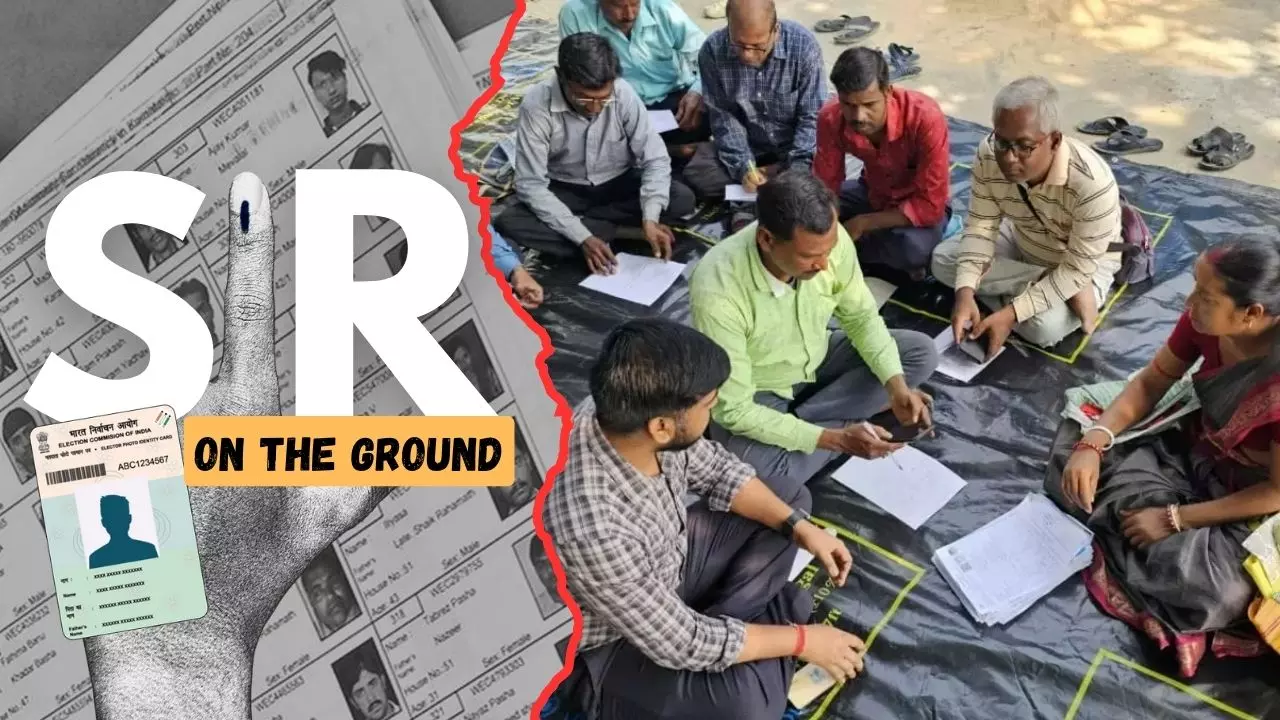
Bengal SIR: BLOs protest over ‘unrealistic targets’ as focus shifts to ‘missing’ voters
Reports from districts indicate that a significant portion of voters remain untraceable, particularly in rapidly changing urban centres such as Kolkata, Kharagpur, and Asansol

Booth Level Officers (BLOs) across West Bengal staged protests on Monday (November 17), citing “unrealistic targets” and mounting workloads, even as the distribution of enumeration forms during the Special Intensive Revision (SIR) of the electoral rolls is almost complete.
With over 99 per cent of voters covered by Monday evening, attention is now shifting to the number of voters who may be marked as “missing”.
In Tamil Nadu, too, SIR is hitting a roadblock since BLOs are complaining over the excess workload.
Voters remain untraceable
Sources in the Chief Electoral Officer’s (CEO) office said this figure could run into a few million, though final numbers are still being compiled.
Also read: TN govt officials boycott SIR duties, announce ‘work stoppage protest’
While the high distribution percentage indicates procedural completion, forms left at addresses or notices pasted after three unsuccessful visits, it does not necessarily reflect direct voter contact, an official said.
BLOs are scheduled to begin collecting completed enumeration forms from Monday, and the completion of this process will reveal the true scale of untraceable voters.
Reports from districts indicate that a significant portion of voters remain untraceable, particularly in rapidly changing urban centres such as Kolkata, Kharagpur, and Asansol.
‘Missing’ women voters
In more than 35 urban localities across various towns and cities, nearly 30 per cent of voters could not be reached, the sources added. They estimate that three to four per cent of the state’s more than seven crore voters could be marked as missing.
Also read: Bengal governor backs SIR, TMC MP accuses Bose of allowing arms in Raj Bhavan
Officials attribute this to high migration, shifting rental patterns, and the redevelopment of slum clusters, which have made it increasingly difficult for BLOs to match voters with the addresses listed in the latest electoral roll.
In rural areas, most “missing” voters are reportedly women whose names remain registered at their parental homes after marriage. In other cases, entire families have migrated for work while their voter cards continue to reflect previous village addresses.
Although BLOs sometimes hand verification forms to relatives, they are required to mark voters “missing” unless contacted directly.
Those who remain unreachable may eventually be classified as “absent”, a status that can ultimately lead to removal from the voter roll.
Each BLO to collect 900-1,200 forms
Amid this, education workers turned BLOs have protested across the state over what they call “unrealistic targets” and excessive workloads. Each BLO is tasked with collecting data from 900-1,200 forms and uploading it to the official app by December 4.
Also read: BJP eyes SIR-driven Bengal sweep after Bihar election victory
With 80,681 booths statewide, this requires daily digitisation of at least 90 forms per BLO. Sources say that digitising a single form takes 15-20 minutes, meaning completing the daily target would take 22 to 30 hours, rendering the task practically impossible.
Protests have erupted in Siliguri, Barrackpore, Kalna, and other districts, with reports of BLOs falling seriously ill due to overwork. On Sunday, a BLO in Kalna, Purba Bardhaman, reportedly died after succumbing to the pressure. In Kolkata’s Beleghata, another BLO was hospitalised after collapsing mid-duty.
Education workers’ unions have demanded immediate relief, calling for extended deadlines, clear written instructions for all duties, and the reduction of additional non-educational tasks.
Calls for pressure to be reduced
General secretary of Shiksha Anuragi Aikyamanch Kinkar Adhikari said, “The additional pressure on BLOs must be reduced immediately. Clear instructions and sufficient time must be provided. Otherwise, it is impossible to work this way.”
The Aikyamanch on Monday marched to the CEO’s office in Kolkata, staging a demonstration and submitting a deputation to voice their protest against excessive workloads.
Meanwhile, a team of the Election Commission (EC) led by deputy commissioner Gyanesh Bharati is scheduled to visit Kolkata on Tuesday to review the progress of SIR before the scheduled release of the draft voter list on December 9.
With BLO protests, heavy workloads and a rising number of untraceable voters, officials say they are under pressure to meet deadlines while ensuring the accuracy of the electoral roll.

